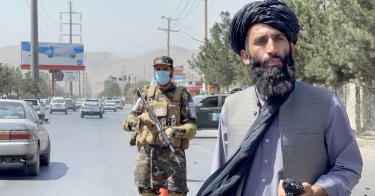This will be a 9/11 anniversary like no other.
An entire generation of Americans has no personal recollection of the terrible events of that day. Just a few weeks ago, some of us anticipated using the occasion as an opportunity to explain to them why that tragedy still matters. Instead, on this 9/11, we’ll be thinking about what’s happened in Afghanistan and wondering how soon the next major terrorist attack on American soil will come.
On Sept. 11, 2001, Islamic terrorists hijacked four airliners and aimed them at New York City and Washington, D.C. The tragedy was seared in the psyche of all Americans. Yet that was a generation ago. For anyone born around the time of the attacks, those events are as remote as Pearl Harbor was from the flower children of the 1960s. Having missed the start of the long war, it was hard for them to understand why American troops were still in places like Iraq and Afghanistan 20 years later.
Even for those of us who witnessed 9/11, the global war on terror had drifted from center stage. Arguably, that is because it had been a war fought for years now on a much smaller scale and largely out of sight of TV cameras. There were, of course, still occasional acts of terror or bloody attacks on U.S. troops that would garner fleeting headlines. But the ongoing war on terror was about more than that.
>>> Joe Biden Is Enabling the Next 9/11
The war was a truly global effort aimed at dismantling the worldwide infrastructure and leadership of groups capable of undertaking audacious attacks like 9/11 and having forces in place to protect us from these threats reviving in the future. Most of us forgot about this war because, by and large, it had been won.
Say whatever you care about Trump’s orange hair and mad tweeting, his presidency tied up a number of loose ends. The ISIS caliphate was destroyed. He checkmated Iran, the world’s leading state sponsor of terrorism. He initiated the Abraham Accords to help stabilize the Middle East and promote collective security and economic development.
Even trouble spots like Syria, Libya and Afghanistan were at least contained. While terrorist activities persist in places like North Africa, these are regional problems. Here at home, U.S. borders were as secure as they had been in generations. The transnational terror threat to America was near nil.
That was then.
As recently as just a few weeks ago, people thought it might be hard to get Americans to notice the 20th anniversary of 9/11. After all, Americans had lots of other things on their minds: COVID was resurgent; inflation was creeping up, and partisan bickering in Washington had reached near unprecedented heights. Meanwhile, kids were heading back to school. Professional football and college sports would soon be back. Foreign policy, it seemed, had been pushed to the very back burner.
Then came the shambolic American withdrawal from Afghanistan.
The mess we have witnessed in Kabul can’t help but change how we feel on 9/11. No matter what side of the “endless wars” debate folks fell on, no one feels good about the chaotic, humiliating evacuation, the tragic death of American military personnel, or the collapse that left our Afghan allies—and all Afghan women, children and Christians—under the heel of the Taliban.
The dispute over who is responsible for this catastrophe will continue far beyond Sept. 11. On the other hand, the consequences of the disaster are already apparent. This defeat will doubtless lead to another round of global terrorism.
For starters, Afghanistan will once again become a sanctuary for transnational terrorism. The Taliban already has ties to known terrorists. Further, the U.S. and its allies will have little visibility about what is going on inside Afghanistan.
The administration continually asserts that we will still be able to operate in the country from “over the horizon.” But military experts know that such rhetoric it largely untethered from reality. The U.S. now has no realistic basing options in the region. As a result, the U.S. has less situational awareness in Afghanistan now than when President Bill Clinton blindly lobbed cruise missiles at al-Qaida in the 1990s.
The U.S. retreat from Afghanistan will inspire Islamist extremists worldwide to rise up again. After all, on the 20th anniversary of al-Qaida’s great victory over “the American Satan,” the Taliban will control more territory, have a more powerful military, more money and more international recognition than the day the Twin Towers came down. How could that not help Islamist terrorist in their recruitment drives around the world?
>>> Yes, We’re Safer From Terrorism Because of Intelligence Reforms After 9/11. However …
How could this groups’ reversal of fortunes occur so quickly? America and freedom have enemies around the world. While nations that oppose us might not risk conducting a campaign of terror directly against the U.S., they would certainly be willing to countenance or even facilitate renewed Islamist extremism if it helps distract America from dealing with them.
And, of all the means of global warfare, terrorism is the easiest to organize and pull off. After all, it focuses mainly on killing unsuspecting innocents as they go about their everyday lives. There are no easier targets.
Global terrorism is only not a problem when the free world takes its seriously. It is like the chronic disease that becomes a major problem only when it goes ignored and untreated.
Before this last month, we took our eye off the terrorist ball. As a result, we will all be looking over our shoulders this 9/11.
This piece originally appeared in The Detroit News




